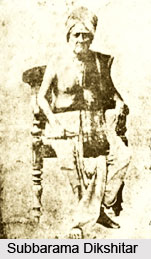 Subbarama Dikshitar was born in the year 1839, and was known for his immense contribution to Carnatic music. He was the grandson of Baluswami Dikshitar, a brother of Muthuswami Dikshitar. He was also a great composer in his own right, but is more popular for his Sangita Sampradaya Pradarshini, a book detailing the works of Muthuswami Dikshitar and a reference on many other Carnatic musical concepts.
Subbarama Dikshitar was born in the year 1839, and was known for his immense contribution to Carnatic music. He was the grandson of Baluswami Dikshitar, a brother of Muthuswami Dikshitar. He was also a great composer in his own right, but is more popular for his Sangita Sampradaya Pradarshini, a book detailing the works of Muthuswami Dikshitar and a reference on many other Carnatic musical concepts.
A fantastic musician that he was at the court of Ettayapuram kings, Baluswami Dikshitar, adopted Subbarama Dikshitar as his own son and taught music to him. Subbarama Dikshitar began composing at the age of seventeen and became the court musician of the Ettayapuram kings at the age of nineteen. He composed many Kritis, Varnams etc.
At the age of 60, Subbarama Dikshitar, began writing the book Sangita Sampradaya Pradarshini at the request of A.M.Chinnaswami Mudaliar and finished it after four years of solid work. It can be said that he was one of the earliest documenters of Indian music and musicology. Subbarama Dikshitar died at a relatively young age of 67.
His other works include: Prathamabhyasa Pustakamu - A beginner`s introduction to Carnatic Music Sanskrta Andhra Dravida Kirtanalu - A collection of compositions of Krishnaswami Ayya and others tuned by him. Subbarama Dikshitar died in the year 1906.
This article is a stub. You can enrich by adding more information to it. Send your Write Up to content@indianetzone.com




















